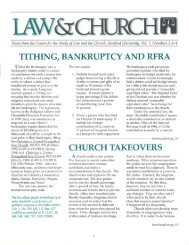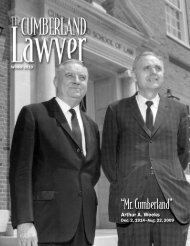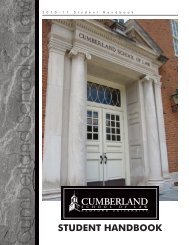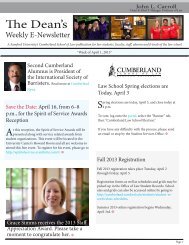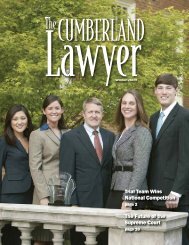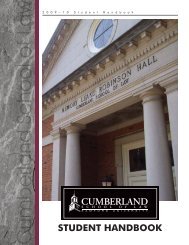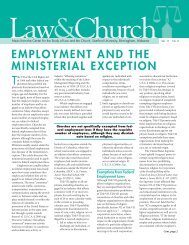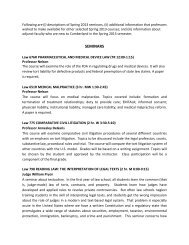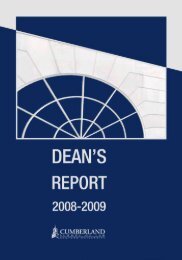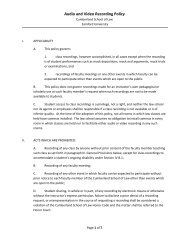Fall 2008 - Cumberland School of Law - Samford University
Fall 2008 - Cumberland School of Law - Samford University
Fall 2008 - Cumberland School of Law - Samford University
Create successful ePaper yourself
Turn your PDF publications into a flip-book with our unique Google optimized e-Paper software.
Tampa attorney Miriam<br />
Mason ’75, a partner in<br />
the marital and family law<br />
practice <strong>of</strong> Mason, Black &<br />
Cabellero, said,“The law<br />
school was very gracious<br />
and welcoming. I never<br />
heard any pr<strong>of</strong>essor treat a woman rudely,<br />
and I felt the school wanted us to succeed.<br />
When I was going to <strong>Cumberland</strong>, we<br />
were divided by the alphabet, and my best<br />
buddies were men who happened to be in<br />
my classes.”<br />
She began law school with 13 other<br />
women in a class <strong>of</strong> 300; only seven women<br />
graduated in 1975.<br />
Mason has been president <strong>of</strong> the<br />
American Academy <strong>of</strong> Matrimonial<br />
<strong>Law</strong>yers, chair <strong>of</strong> the Family <strong>Law</strong> Section <strong>of</strong><br />
the Florida Bar organizations and chair <strong>of</strong><br />
the Family <strong>Law</strong> Rules Committee <strong>of</strong> the<br />
Florida Bar. She believes the younger<br />
generation, both men and women, are<br />
more focused on their quality <strong>of</strong> life than in<br />
her generation.“They are more sophisticated<br />
than my generation,” she said.<br />
“Women lawyers feel and are equal.They<br />
feel they belong in law school and the legal<br />
pr<strong>of</strong>ession. In my years, we felt like we had<br />
to overachieve to be on equal ground.”<br />
Lyle Warshauer ’93 was<br />
not fazed by the vestiges <strong>of</strong><br />
sexism in her legal career,<br />
but she feels challenged<br />
with how she balances her<br />
family and work.“I was on<br />
the phone to my <strong>of</strong>fice 30<br />
minutes after my daughter was born,” she<br />
said. She knows that most mothers have<br />
two full-time jobs, but she says the fulfillment<br />
<strong>of</strong> her home and pr<strong>of</strong>essional life is<br />
well worth any inconveniences.“All the<br />
complexities and difficulties are worth it<br />
because I truly love being a trial lawyer,”<br />
she said.<br />
Warshauer, who owns a small firm in<br />
Atlanta, Ga., has caught glimpses <strong>of</strong> the glass<br />
ceiling.“One firm I interviewed with held<br />
its partner meetings at a male-only club,”<br />
she said.“When I asked about the status <strong>of</strong><br />
one <strong>of</strong> the female partners, they said she<br />
could come to the meeting, but had to<br />
leave when dinner was served.”<br />
Laurie Weatherford ’86 remembers a<br />
conversation she had with a male colleague<br />
3-4 years out <strong>of</strong> law school. He told her,<br />
“The worst thing about women lawyers is<br />
that they take up space in law school and<br />
then they don’t use their education.”<br />
Weatherford tells young women not to<br />
be bothered by being underestimated.“It<br />
always works to your advantage,” she said.<br />
“I’ve experienced it many times in trying<br />
cases.”<br />
She remembers when she once<br />
represented a Chapter 7 trustee and the<br />
other attorney wanted to go first.“When I<br />
did my questioning, he said,‘You are a<br />
good lawyer.’ He was so amazed,” she<br />
recounted.“I may be a woman, but I’m not<br />
any less <strong>of</strong> a lawyer.”<br />
A Chapter 13 standing trustee in<br />
Winter Park, Fla.,Weatherford enjoys the<br />
collegiality <strong>of</strong> “a very civil group <strong>of</strong> people<br />
on the Orlando bankruptcy bar,” and the<br />
luxury <strong>of</strong> having a staff and staff attorney<br />
(Sam Pennington ’79). She feels a<br />
responsibility to help young lawyers,<br />
particularly women.<br />
“Younger women have it easier and<br />
expect it to be a lot easier than it is,” she<br />
said.“I tell them reputation is all you have.<br />
My personal motivation is to be a mentor<br />
and to give personal support to help the<br />
younger generation. I really feel this is what<br />
God wanted me to do.”<br />
Lydia Quarles ’75 heard<br />
the clichéd challenge in<br />
law school orientation:<br />
“Look to your left and<br />
look to your right. One <strong>of</strong><br />
the three <strong>of</strong> you won’t<br />
make it.” But the speech<br />
had an added twist.<br />
“The guy on my left looked at me and<br />
said,‘You took my frat brother’s place, and<br />
now you’re not going to make it,’” she said.<br />
She ignored the fraternity brother’s<br />
disappointment, but it prepared her for<br />
some <strong>of</strong> the challenges she would face at<br />
the law school.“Some pr<strong>of</strong>essors gave you a<br />
harder time, and there were some guys who<br />
gave me grief. But most people were good<br />
people,” she said.<br />
Returning to Mississippi upon graduation,<br />
she went from clerking for Mississippi<br />
Supreme Court Justice Pelham Merrill to a<br />
large firm, but realized it was not for her. She<br />
joined a small Columbus firm and realized<br />
there were no other women lawyers in town.<br />
Quarles returned to Lowndes County<br />
and became the second female lawyer in<br />
the circuit and chancery court district.<br />
“The first, Chief Justice Lenore Loving<br />
Prather, provided a wonderful role model,<br />
but in many ways I was on my own to<br />
demonstrate my ability, my independence<br />
and my skills,” she said.“Being gregarious<br />
13<br />
probably helped, but I set out to meet who<br />
I needed to meet and to learn what I<br />
needed to learn in order to be an effective<br />
attorney in Lowndes County.”<br />
Today, she is a senior policy analyst for<br />
the Stennis Institute <strong>of</strong> Government in her<br />
hometown <strong>of</strong> Starkville. She holds<br />
Congressional debates in the districts, writes<br />
articles for legislators and performs some<br />
mediations. Previously, she was an administrative<br />
judge and commissioner <strong>of</strong> the<br />
Mississippi Workers’ Compensation<br />
Commission. She is cochair <strong>of</strong> the<br />
Mississippi Supreme Court’s Gender<br />
Fairness Study Committee.<br />
Quarles believes most law firms look at<br />
women and ask the same questions they ask<br />
male candidates, such as “Will she impress<br />
clients?” or “Will she have authority in the<br />
courtroom?” She notes that women still<br />
face challenges in the field, however.<br />
“My biggest concern is that women<br />
lawyers in their 20s and 30s are absolutely<br />
clueless about what is relatively new:<br />
women in the law,” she said.“I once did a<br />
presentation for the Evelyn Gandy Lectures<br />
(named for the first female lieutenant<br />
governor <strong>of</strong> Mississippi), and reminded the<br />
25-year-olds that when I was in law school,<br />
to prescribe birth control to an unmarried<br />
women was a crime. Mississippi didn’t ratify<br />
the 19th Amendment until 1984.Thirty<br />
years isn’t a long time.There were 100 years<br />
<strong>of</strong> male dominance, and lots <strong>of</strong> conventions<br />
have developed with men in the legal<br />
pr<strong>of</strong>ession.<br />
“There is a long record <strong>of</strong> women<br />
lawyer burn out,” she continued.“Policies<br />
have matured, but law firms still don’t want<br />
to hire women because they say they’ll<br />
want to work part-time, to have kids.”<br />
Public vs. Private<br />
<strong>Cumberland</strong> <strong>School</strong> <strong>of</strong><br />
<strong>Law</strong>’s 2006 Distinguished<br />
Alumna Anne Pope ’86 is<br />
the tenth federal cochair <strong>of</strong><br />
the Appalachian Regional<br />
Commission, an economic<br />
development partnership<br />
between the federal government and the<br />
governors <strong>of</strong> 13 states. She views the public<br />
sector as a leveler for male and female<br />
attorneys.“I’ve seen more women at very<br />
high levels, places <strong>of</strong> real opportunity, in<br />
government rather than business,” she said.<br />
“It’s a place I would recommend for young<br />
continued on page 14



